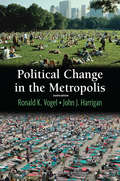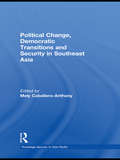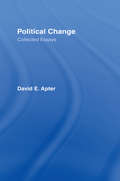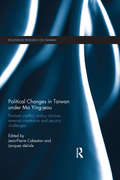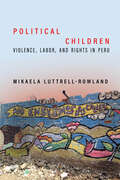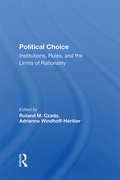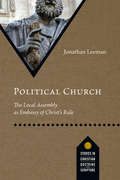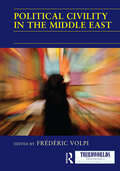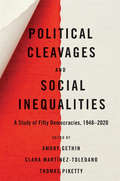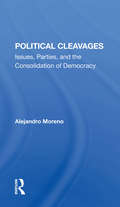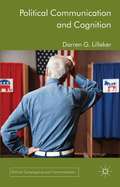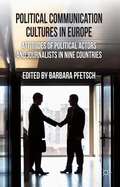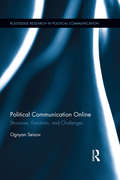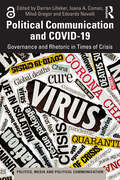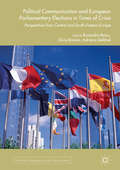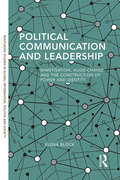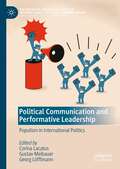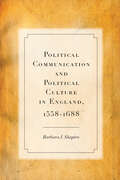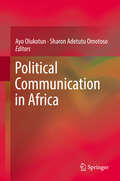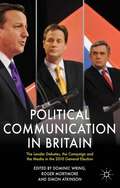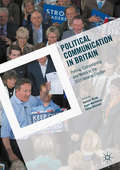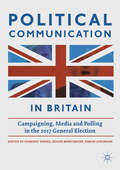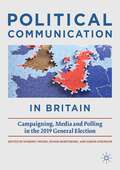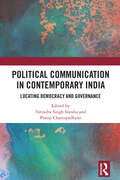- Table View
- List View
Political Change in the Metropolis
by Ronald Vogel John HarriganThis popular text has been thoroughly updated and revised to sharpen the focus on its 'bias and change' theme, include the latest data/studies informing the field, and cover important new topics (e.g., flood disaster in New Orleans). Political Change in the Metropolis, Eighth Edition, continues to focus on the political changes that have taken place in American cities and the reactions of urban scholars to them. In addition to offering scholarly perspectives, the text offers students a theoretical framework for interpreting these changing events for themselves. This framework analyzes the patterns of bias inherent in the organization and operation of urban politics, giving students an in-depth look at the fascinating and constantly changing face of urban politics. Features Accessible writing style engages students in the material. Provides excellent coverage of the impact of immigrants and ethnic groups in the making of the American city. An abundance of historical material helps students better understand the origins and development of urban politics and structures. Case studies throughout the text give students an opportunity to apply important material. The text exposes students to first-rate discussions of political phenomena and empirical literature on those phenomena.
Political Change, Democratic Transitions and Security in Southeast Asia (Routledge Security in Asia Pacific Series)
by Mely Caballero-AnthonyThe fragility of democracy in Southeast Asia is a subject of increasing concern. While there has been significant movement in the direction of democratisation, the authoritarian tendencies of popularly elected leaders and the challenges posed by emerging security threats have given rise to a shared concern about the return of military rule in the region. This book examines the nature of political transitions in Southeast Asia and why political transitions towards political liberalisation and democracy have often failed to take off. It considers political systems in Southeast Asia that have gone through significant periods of transition but continue to face serious challenges toward democratic consolidation. Some key questions that the book focuses on are – Are emerging democracies in the region threatened by weak, failed or authoritarian leadership? Are political institutions that are supposed to support political changes toward democratisation weak or strong? How can democratic systems be made more resilient? and What are the prospects of democracy becoming the defining political landscape in Southeast Asia?
Political Change: A Collection of Essays
by David E. ApterPublished in the year 1973, Political Change is a valuable contribution to the field of Politics.
Political Changes in Taiwan Under Ma Ying-jeou: Partisan Conflict, Policy Choices, External Constraints and Security Challenges (Routledge Research on Taiwan Series)
by Jacques DeLisle Jean-Pierre CabestanIn 2008 Ma Ying-jeou was elected President of Taiwan, and the Kuomintang (KMT) returned to power after eight years of rule by the Democratic Progressive Party (DPP). Since taking power, the KMT has faced serious difficulties, as economic growth has been sluggish, society has been polarised over issues of identity and policy, and rapprochement between Taipei and Beijing has met with suspicion or reservation among large segments of Taiwanese society. Indeed, while improved relations with the United States have bolstered Taiwan’s security, warming cross-Strait relations have in turn made Taiwan more dependent upon and vulnerable to an increasingly powerful China. This book provides a comprehensive analysis of the return of the Kuomintang (KMT) to power, and examines the significant domestic political, economic, social and international challenges and changes that have characterized Taiwan since 2008. It identifies the major domestic, cross-Strait and foreign policy trends, and addresses key issues such as elections and Taiwan’s party system; the role of the presidency and legislature; economic development; social movements; identity politics; developments in cross-Strait relations; Taiwan’s security environment and national defence policies; relations with the US and Japan. In turn, the contributors look towards the final years of Ma’s presidency and beyond, and the structural realities – both domestic and external – that will shape Taiwan’s future. Political Changes in Taiwan Under Ma Ying-jeou will be of great interest to students and scholars of Taiwan studies, comparative politics, international relations, and economics. It will also appeal to policy makers working in the field.
Political Children: Violence, Labor, and Rights in Peru
by Mikaela Luttrell-RowlandGrounded in extensive interviews, longitudinal methods, historical analysis, and archival work, Mikaela Luttrell-Rowland shows how two distinct groups of working young people in Lima, Peru have become political protagonists, resisting and critiquing the daily inequality and injustice they face. She details the ways these young people interpret and address a range of issues affecting their lives—from environmental degradation to second-rate public facilities, gender-based violence to dangerous working conditions—and reveals a range of ways they make sense of their systematic marginalization and their own labor, and in doing so, how they navigate everyday state violence. By attending to the affect, longing, and desires that animate these young people's politics, Luttrell-Rowland conveys the meaning of their lives and work in an economy that invokes their subjectivity and rights while rendering them non-participatory subjects. Though the lives of young people are often imagined as far from politics, these "political children" expose the contradictions of public policy narratives in which the Peruvian state is cast as a neutral site for engagement and action. Through their criticism and activism, the young people in this book demonstrate that such narratives divorce state power from the very places in which it is experienced as structural violence.
Political Choice: Institutions, Rules And The Limits Of Rationality
by Roland M Czada Adrienne Windhoff-HeritierThis book, subtitled "political actors in institutional settings", addresses the main lines of reasoning of the new political institutionalism and rational choice theory. It discusses the question: Which particular rules, logics, or strategies of action can be found in the realm of politics?
Political Church: The Local Assembly as Embassy of Christ's Rule (Studies in Christian Doctrine and Scripture)
by Jonathan LeemanThe church is political. Theologians have been debating this claim for years. Liberationists, Anabaptists, Augustinians, neo-Calvinists, Radical Orthodox and others continue to discuss the matter. What do we mean by politics and the political? What are the limits of the church's political reach? What is the nature of the church as an institution? How do we establish these claims theologically? Jonathan Leeman sets out to address these questions in this significant work. Drawing on covenant theology and the "new institutionalism" in political science, Leeman critiques political liberalism and explores how the biblical canon informs an account of the local church as an embassy of Christ's kingdom. Political Church heralds a new era in political theology.
Political Civility in the Middle East (ISSN)
by Frédéric VolpiContemporary debates about civility are shaped by the dominant liberal and secular narratives of a peaceful world of sovereign nation-states. For contemporary scholars and policy makers, the challenge is to insert meaningfully the political evolution of the Middle East in the dominant liberal-democratic discourse about the current international order without invoking ill-conceived notions of Islamic exceptionalism.The analyses gathered in this book challenge conventional ‘western’ perspectives on civility as an expression of state-guaranteed free association in a non-violent space of discourse and behaviour. Considering the articulation of ‘civil’ and ‘civilized’ state-society relations in contemporary Middle Eastern polities, this book proposes both conceptual and empirical insights into the dynamics of the local, national and trans-national formation of civility and of the civil sphere. Bypassing traditional oppositions between the ‘western’ and ‘Islamic’ modernity, it provides an account of the communicative clusters of civility that represent the everyday formations of Islamic and secular subjects in settings organized by authoritarian-inclined state institutions and practices. It examines how the grassroots formation of ‘new’ religious and secular identities/subjectivities and their relations with the ‘Other’ underpin, as well as challenge and transform, the state-led processes of political ordering of a national and regional community.This book was originally published as a special issue of Third World Quarterly.
Political Cleavages and Social Inequalities: A Study of Fifty Democracies, 1948–2020
by Thomas Piketty Amory Gethin Clara Martínez-ToledanoThe empirical starting point for anyone who wants to understand political cleavages in the democratic world, based on a unique dataset covering fifty countries since World War II.Who votes for whom and why? Why has growing inequality in many parts of the world not led to renewed class-based conflicts, seeming instead to have come with the emergence of new divides over identity and integration? News analysts, scholars, and citizens interested in exploring those questions inevitably lack relevant data, in particular the kinds of data that establish historical and international context. Political Cleavages and Social Inequalities provides the missing empirical background, collecting and examining a treasure trove of information on the dynamics of polarization in modern democracies.The chapters draw on a unique set of surveys conducted between 1948 and 2020 in fifty countries on five continents, analyzing the links between voters’ political preferences and socioeconomic characteristics, such as income, education, wealth, occupation, religion, ethnicity, age, and gender. This analysis sheds new light on how political movements succeed in coalescing multiple interests and identities in contemporary democracies. It also helps us understand the conditions under which conflicts over inequality become politically salient, as well as the similarities and constraints of voters supporting ethnonationalist politicians like Narendra Modi, Jair Bolsonaro, Marine Le Pen, and Donald Trump.Bringing together cutting-edge data and historical analysis, editors Amory Gethin, Clara Martínez-Toledano, and Thomas Piketty offer a vital resource for understanding the voting patterns of the present and the likely sources of future political conflict.
Political Cleavages: Issues, Parties, And The Consolidation Of Democracy
by Alejandro MorenoIn Political Cleavages: Issues, Parties, and the Consolidation of Democracy, Alejandro Moreno argues that the political split between authoritarian and democratic ideologies is the main determinant of party competition in less-developed, relatively new democracies. That is, political competition is drawn between those parties that propose to furthe
Political Communication And Cognition
by Darren G. LillekerPolitical Communication and Cognition draws on a range of theories from communication psychology to explain how citizens receive communication about politics, how communication might make a citizen think and importantly what stimulates political participation, whether simply paying attention, chatting online or going to vote.
Political Communication Cultures in Europe
by Barbara PfetschThis book offers new and compelling insight into the orientations that shape the cultures of political communication in nine Western democracies. It is a truly comparative account of the views of 2500 political elites and media elites between Helsinki and Madrid on their relationship and their exchanges.
Political Communication Online: Structures, Functions, and Challenges (Routledge Research in Political Communication)
by Ognyan SeizovThe impact of the Internet on political communication has been significant and multifaceted: it expanded the reach of political messages; opened the floodgates of decontextualization and intercultural misunderstanding; made room for new genres and forms; and allowed for the incorporation of every previously existing communication mode into complex multilayered documents. Political Communication Online places these developments in their social and media context, covers various disciplinary backgrounds and how they can contribute to a common understanding of the evolving online media landscape, and proposes a novel methodological tool for the analysis of political communication online. Seizov offers an approach that places context at the core of the theoretical and methodological discussion by discussing the traits of online communication that make it a unique communication environment. The book then brings together different disciplines which have important contributions for the study of political communication online but have not been integrated for this purpose so far, such as visual communication, multimodal research, and cognitive psychology. Seizov introduces the book’s main theoretical and methodological contribution to multimodal document analysis, the annotation scheme "Imagery and Communication in Online Narratives" (ICON), and explores how the ICON approach works in practice. Taking four distinct genres of online political communication – news, election campaigns, NGOs, and social movements – the book presents the analyses of convenience samples from each of them in detail. This text features a comprehensive theoretical discussion of vital current developments in online political communication, places these developments in context, and couples that with a practical demonstration of the novel methodology it proposes.
Political Communication and COVID-19: Governance and Rhetoric in Times of Crisis (Politics, Media and Political Communication)
by Darren Lilleker, Ioana A. Coman, Miloš Gregor and Edoardo NovelliThis edited collection compares and analyses the most prominent political communicative responses to the outbreak and global spread of the COVID-19 strain of coronavirus within 27 nations across five continents and two supranational organisations: the EU and the WHO. The book encompasses the various governments’ communication of the crisis, the role played by opposition and the vibrancy of the information environment within each nation. The chapters analyse the communication drawing on theoretical perspectives drawn from the fields of crisis communication, political communication and political psychology. In doing so the book develops a framework to assess the extent to which state communication followed the key indicators of effective communication encapsulated in the principles of: being first; being right; being credible; expressing empathy; promoting action; and showing respect. The book also examines how communication circulated within the mass and social media environments and what impact differences in spokespersons, messages and the broader context has on the success of implementing measures likely to reduce the spread of the virus. Cumulatively, the authors develop a global analysis of the responses and how these are shaped by their specific contexts and by the flow of information, while offering lessons for future political crisis communication. This book will be of great interest to students and researchers of politics, communication and public relations, specifically on courses and modules relating to current affairs, crisis communication and strategic communication, as well as practitioners working in the field of health crisis communication.
Political Communication and European Parliamentary Elections in Times of Crisis
by Ruxandra Boicu Silvia Branea Adriana StefanelThis book tackles the 2014 European Parliamentary election as an event, phenomenon and process from an interdisciplinary but coherent perspective. This edited volume includes research by prestigious academics from the former communist countries in question, all of which have only recently become EU members. The contributors consider whether there is a crisis of Euroscepticism, or, for that matter, extremism of any kind in each country discussed. In doing so, the volume seeks to analyse the future of the European Union itself. It will appeal to scholars and graduate students interested in elections and voting behaviour, comparative European politics, and political communication.
Political Communication and European Parliamentary Elections in Times of Crisis: Perspectives from Central and South-Eastern Europe (Political Campaigning and Communication)
by Ruxandra Boicu, Silvia Branea and Adriana StefanelThis book tackles the 2014 European Parliamentary election as an event, phenomenon and process from an interdisciplinary but coherent perspective. This edited volume includes research by prestigious academics from the former communist countries in question, all of which have only recently become EU members. The contributors consider whether there is a crisis of Euroscepticism, or, for that matter, extremism of any kind in each country discussed. In doing so, the volume seeks to analyse the future of the European Union itself. It will appeal to scholars and graduate students interested in elections and voting behaviour, comparative European politics, and political communication.
Political Communication and Leadership: Mimetisation, Hugo Chavez and the Construction of Power and Identity (Routledge Studies in Global Information, Politics and Society)
by Elena BlockThe long-lasting hegemonic rule of President Hugo Chávez not only involved significant rearrangements in the control of political power in Venezuela but also shifts in the way its citizens constructed, connected and interacted with politics. In this book, Elena Block explores the political communication style developed by Chávez to transmit his ideologies and engage with his publics — A style that unfolded incrementally between 1998, the year of his first presidential campaign, and March 13th 2013 when his death was announced after a long struggle with cancer. What sort of political communication did Hugo Chávez develop to establish hegemony in Venezuela? What made him so popular? Block argues that Chávez’s political communication style can be better understood through the concept of mimetisation, a systematic sequence of communicational events and practices whereby the Venezuelan President managed to build a bond with his constituents. Applying a mixed qualitative method of collection and analysis of relevant data, this phenomenon is examined via the President’s emotional use of common cultural symbols; dramatized and informalised language; savvy use of communication and media, and boost of inclusive, compensatory, and participatory practices in which his constituents not only felt mimetically mirrored, but also endowed with an identity. Shedding new light on contemporary theories of populism from the perspective of political communication and identity construction, the notion of mimetisation can be adjusted and applied to study the links of populist phenomena, the mediatisation of politics and government, cultural appeal and identity politics in other cultures and situations in contemporary times.
Political Communication and Performative Leadership: Populism in International Politics (The Palgrave Macmillan Series in International Political Communication)
by Corina Lacatus Gustav Meibauer Georg LöfflmannThis edited collection explores the intersections of populist communication, performative leadership and international politics. It investigates the mechanisms and dynamics connecting these core conceptual fields and offers empirical examples. Together, the contributors to the volume argue that populist communication, i.e. the language, deliberation and discursive performance of populist ideas, has a profound and lasting impact not only on domestic politics, but in terms of foreign policies as well as the conduct of international politics writ large. First, populist communication shapes how global, regional and transborder issues are debated and strategically used for political purposes domestically. Second, populist communication changes when and how states and other actors in turn formulate responses and policies vis-a-vis, for example, migration, global health, climate change, trade, or war. Finally, populist communication affects the nature of international politics. It influences how actors conduct themselves internationally, and how we may conceive of core concepts and practices such as diplomacy, security, cooperation, and order. To illustrate these mechanisms, the contributors explore cases from around the world, demonstrating the relevance of populist communication for international politics in both the Global South and the Global North.
Political Communication and Political Culture in England, 1558-1688
by Barbara J. ShapiroThis book surveys the channels through which political ideas and knowledge were conveyed to the English people from the beginning of the reign of Elizabeth I to the Revolution of 1688. Shapiro argues that an assessment of English political culture requires an examination of all means by which this culture was expressed and communicated. While the discussion focuses primarily on genres such as the sermon, newsbook, poetry, and drama, it also considers the role of events and institutions. Shapiro is the first to explore and elucidate the entire web of communication in early modern English political life.
Political Communication in Africa
by Ayo Olukotun Sharon Adetutu OmotosoThis book offers a comprehensive account of the nature and development of political communication in Africa. In light of the growing number of African states now turning towards democratic rule, as well as the growing utilization of information technologies in Africa, the contributors examine topics such as: the role of social media in politics, strategic political communication, political philosophy and political communication, Habermas in Africa, gender and political communication, image dilemma in Africa, and issues in political communication research in Africa, and identify the frontiers for future research on political communication in Africa.
Political Communication in Britain
by Dominic WringThis book offers a unique exploration of the 2015 General Election from the perspectives of those most intimately involved as strategists, journalists and analysts. It features contributions from the rival parties, news and polling organizations as well as academic experts who examine all aspects of the campaign. A common theme that emerges is the increasing complexity of the democratic process given the development of a more multifaceted party system and a growing fragmentation in mass media audiences. The UK electoral landscape has changed: in 2015 six parties received more than a million votes whereas in the 2010 General Election it was only three. This book provides invaluable insights into contemporary British politics through analysis of an election whose outcome, an outright Conservative victory, surprised many commentators. It will appeal to students and scholars in the fields of electoral politics and media and communication, as well as to practitioners and the wider reader interested in British general elections.
Political Communication in Britain
by Dominic Wring Roger Mortimore Simon AtkinsonThis book offers a unique exploration of the 2015 General Election from the perspectives of those most intimately involved as strategists, journalists and analysts. It features contributions from the rival parties, news and polling organizations as well as academic experts who examine all aspects of the campaign. A common theme that emerges is the increasing complexity of the democratic process given the development of a more multifaceted party system and a growing fragmentation in mass media audiences. The UK electoral landscape has changed: in 2015 six parties received more than a million votes whereas in the 2010 General Election it was only three. This book provides invaluable insights into contemporary British politics through analysis of an election whose outcome, an outright Conservative victory, surprised many commentators. It will appeal to students and scholars in the fields of electoral politics and media and communication, as well as to practitioners and the wider reader interested in British general elections.
Political Communication in Britain: Campaigning, Media and Polling in the 2017 General Election
by Dominic Wring Roger Mortimore Simon AtkinsonPolitical Communication in Britain is a now established series of nine books, the first of which appeared in the aftermath of the 1979 General Election. This book follows the structure of previous volumes and features commentaries and assessments from the pollsters who monitored voter opinion during the 2017 General Election. It also includes chapters from party strategists responsible for devising and executing the rival campaigns. Furthermore contributions from journalists offer a media perspective on the campaign. The remainder of the book consists of academic material designed to complement and augment the aforementioned professionals’ chapters. Here the focus is on the major dynamics of political communication, specifically the roles of the press, television, advertising, internet and other such phenomena during the 2017 Snap Election.
Political Communication in Britain: Campaigning, Media and Polling in the 2019 General Election
by Dominic Wring Roger Mortimore Simon AtkinsonPolitical Communication in Britain offers unique insights from various members of the party, media, and polling organizations that contested, reported, and analysed the 2019 British General Election, as well as leading academic experts who have researched the campaign. Following an essay by Sir John Curtice exploring how the critical issue of Brexit influenced the election, the opening part of this volume features insiders discussing their respective parties’ operations, including their successes and disappointments. This section also includes expert examinations of Boris Johnson’s ‘oven ready deal’ as well as the digital advertising and controversial public relations efforts that helped promote it. The middle part of the book considers the media, with chapters from the BBC, Sky News, and regulator Ofcom, along with analyses of the pro-Conservative press, digital-only plat[1]forms, and the more left-leaning alternative news sites. The closing section of the volume turns to public attitudes, with experts, including leading pollsters, exploring how these contributed to the Conservatives’ victory. Dedicated chapters also place opinion research in broader context through examining the historical role of the exit poll, and the changing reception and reporting of polls both online and in print. Political Communication in Britain provides readers with an indispensable guide to the 2019 General Election from several of those most intimately involved in the campaign.
Political Communication in Contemporary India: Locating Democracy and Governance
by Yatindra Singh Sisodia Pratip ChattopadhyayThis book explores the forms, patterns, and trends in political communication in India in the twenty-first century. It underlies the influence of context in political messaging laying bare its complex, overlapping, and multidimensional structures. The volume: Examines how political decision-making is shaped by media — through political speeches, community opinion leaders, and formal and informal public conversations. Explores a range of political communication channels— from community radio to social media. Presents an overview of the problems associated with message designing and message dissemination through communication channels in a political setting. Highlights how political communication impacts critical aspects of democracy and governance and goes beyond mere rhetoric. A comprehensive work on the production, diffusion, transmission, and impact of information in a political environment, this book will be of great interest to scholars and researchers of politics, governance, democracy, media and communication studies, journalism, cultural studies, and South Asian studies.
